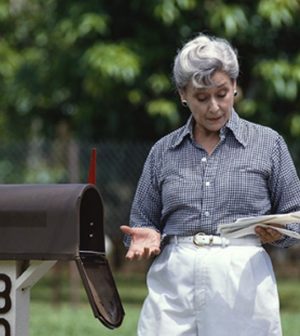- Could Your Grocery Store Meat Be Causing Recurring UTIs?
- Are You Making This Expensive Thermostat Error This Winter?
- Recognizing the Signs of Hypothyroidism
- 10 Strategies to Overcome Insomnia
- Could Artificial Sweeteners Be Aging the Brain Faster?
- Techniques for Soothing Your Nervous System
- Does the Water in Your House Smell Funny? Here’s Why
- Can a Daily Dose of Apple Cider Vinegar Actually Aid Weight Loss?
- 6 Health Beverages That Can Actually Spike Your Blood Sugar
- Treatment Options for Social Anxiety Disorder
Could the U.S. Mail Deliver Better Colon Cancer Screening Rates?

No one likes to get a colonoscopy, but new research suggests that mailing at-home colon cancer tests to folks who are overdue for their checks might prompt them to get screened.
“We believe that mailing kits directly to patients, which frames participation as the default, reduced steps in the screening process, making it easier for patients to get screened and catch colorectal cancer earlier or even potentially prevent it from occurring,” said study senior author Dr. Chyke Doubeni. He is a professor at Penn Medicine in Philadelphia.
Colon cancer is the second leading cause of cancer death in the United States. But only six of 10 adults aged 50 to 75 — the recommended age range for routine screening — were screened in 2015.
Failure to get routine screening increases the risk of colon or rectal cancer death, the study authors noted in a Penn news release.
This study included nearly 900 patients who were overdue for colon cancer screenings. That meant they hadn’t had a colonoscopy in 10 years, a flexible sigmoidoscopy in five years, or stool testing in the last year.
All of the patients were mailed a fecal immunochemical test kit from their primary care provider, and encouraged to complete the test at home and send it back within two months. Some were offered financial rewards for doing so, while others were not.
About 24 percent of patients mailed back completed kits within two months of receiving them, and 29 percent did so within six months. Financial incentives were not a factor, according to the report published online March 22 in JAMA Open Network.
Study author Dr. Shivan Mehta, associate chief innovation officer at Penn Medicine, pointed out that the response rate was relatively high considering that the researchers “only reached out to patients who had not been previously up-to-date, despite having a primary care clinician.”
More information
The U.S. National Cancer Institute has more on colorectal cancer screening.
Source: HealthDay
Copyright © 2026 HealthDay. All rights reserved.










